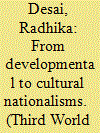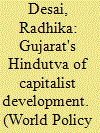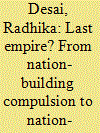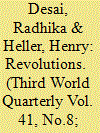|
|
|
Sort Order |
|
|
|
Items / Page
|
|
|
|
|
|
|
| Srl | Item |
| 1 |
ID:
081246


|
|
|
|
|
| Publication |
2008.
|
| Summary/Abstract |
That developmental and cultural nationalisms had opposite foci should not imply that developmental nationalisms comprised only political economy and cultural nationalisms only cultural politics. It does mean, however, that within each of these historical types of nationalism (and presumably other such historical categories may be elaborated by improving the still rudimentary framework we propose and extending it to other periods in nationalisms' history) both aspects acquired a distinctive settled form. This conclusion indicates the chief ways in which the contributions illuminate, elaborate and interrogate the political economy and cultural politics of developmental nationalisms and of cultural nationalisms and the transitions between them. One-sidedly, it emphasizes coherence, conformity and elaboration, where possible in the voices of the contributors themselves, leaving the task of reflecting on dissonances and the outstanding questions the contributors raise, fittingly perhaps, for a future station in the journey of this idea.
|
|
|
|
|
|
|
|
|
|
|
|
|
|
|
|
| 2 |
ID:
108987


|
|
|
|
|
| Publication |
2011.
|
| Summary/Abstract |
Commentators contemplating the hold of Hindutva in Gujarat swing between anxiously wondering whether it shows where the rest of the country is headed and complacent insistence that it is exceptional. Against the background of a wider understanding of the main drivers of Hindutva, and the pattern of its differential advance in the States and regions of India, this paper argues that the hold of Hindutva in Gujarat can be explained by a combination of three factors: aspects of its inherited caste and class structure; the levels and patterns of capitalist development; and the patterns of social polarisation their combination has produced. Given the historic fragmentation of its upper castes, Gujarat's specificity in providing exceptionally fertile ground for the growth and stabilisation of Hindutva can be attributed to the fast pace of its capitalist development and consequently fast economic advance of its middle castes and their social and political assimilation into the formerly Savarna ruling bloc through Hindutva. Given that the differences of inherited social structure and culture are differences of degree and not quality, and that capitalist and neo-liberal development is not questioned, indeed is zealously pursued everywhere in India, and given that social polarisation is considered an acceptable cost of development, Gujarat could well be the image of India's future.
|
|
|
|
|
|
|
|
|
|
|
|
|
|
|
|
| 3 |
ID:
078964


|
|
|
|
|
| Publication |
2007.
|
| Summary/Abstract |
Even as the literature on US imperialism proliferates, US military and political failures in Iraq and Afghanistan have become apparent, and the hollowness of the economic and financial foundations of the US imperial enterprise has been revealed. This article attempts a new interpretation of the more important dynamics of US imperialism from the birth of the republic to its present quagmire in the oil-lands of the East, focusing on its weaknesses. It argues that, while the US state has been expansionist and imperial from its earliest days the reality of its imperial achievement has been shallower than that of any previous empire, prompting the need for qualifiers like 'empire like no other', 'soft power', etc. The article concludes tentatively by pointing to the chief elements in the contemporary conjuncture which lead us to expect the end of empires altogether.
|
|
|
|
|
|
|
|
|
|
|
|
|
|
|
|
| 4 |
ID:
173440


|
|
|
|
|
| Summary/Abstract |
Most revolutions against capitalism have occurred in ‘backward’ and Third World societies, and they have divided and disarrayed Marxisms in the West. One key reason, this paper argues, is intellectual. When, long ago, Marxists surrendered to the bourgeois challenge to Marx – neoclassical economics – developing, in place of Marx’s critical political economy, a ‘Marxist economics’, they lost touch with Marx’s analysis of capitalism as contradictory value production. That analysis could illuminate how capitalism’s contradictions drive its imperialist expansionism and how and why resistance to it must, equally necessarily, take national forms. As a result, major currents of Marxism in the West either have paid attention to imperialism and anti-imperialist resistance but without Marx’s analysis of capitalism as contradictory value production or have insisted that their (mistaken) conception of Marx’s analysis implies that capitalism has no necessary connection with imperialism. Neither tradition can actually develop Marxism to comprehend the actual historical record of revolutions since Marx’s time. Neither can inform new mobilisations against capitalism, whether in or outside its homelands. It is high time we return to Marx’s analysis of capitalism as value production and develop it.
|
|
|
|
|
|
|
|
|
|
|
|
|
|
|
|
| 5 |
ID:
081234


|
|
|
|
|
| Publication |
2008.
|
| Summary/Abstract |
This introduction provides the historical and intellectual historical context for our thesis of the transition from developmental to cultural nationalisms. After settling issues of definition and periodisation in relation to nations, nationalisms and the international order, I outline how, in all the main phases in the three-century long birth of the international world out of one of empires, capitalist and precapitalist, in tandem with the spread of capitalism (and initially, imperialism), nations and nationalisms were understood and, often revealingly, misunderstood. Three main distorting factors accounted for the misunderstandings: 1) the implication of nations and nationalisms in the spread of capitalism was ignored; 2) their role, in comparison with imperialism, the other major geopolitical dynamic of the past few centuries, was underestimated; and 3) capitalism was understood, one-sidedly, as a universalising force, a prejudice reinforced by imperialism (especially when it was largely the imperialism of one country, England, in the 19th century). The universal Enlightenment intellectual temper also played a role and it is not surprising, in retrospect, that scholarship on nationalism burgeoned precisely at the time, in the last third of the 20th century, when attention to difference and particularity and the questioning of universal thinking became the leading intellectual trend. This scholarship, however, only accentuated the dominant tendency to understand nations culturally, in separation from political economy and it proved unable to stall the force of the mistaken 'globalisation' thesis about the decline of nations and nationalisms. Throughout this discussion critical insights which more-or-less escaped these distortions and detected the intertwining of culture and political economy in nationalism are noted.
|
|
|
|
|
|
|
|
|
|
|
|
|
|
|
|
| 6 |
ID:
173434


|
|
|
|
|
| Summary/Abstract |
We held the ‘Revolutions’ conference in 2017 to commemorate the Russian Revolution and redeem the actual record of revolutions in the Third World for the left. A quarter-century after the demise of the USSR, we found liberal capitalist triumphalism unwarranted. Two of the most important expectations to which it gave rise – that the world had become ‘unipolar’ and that it would enjoy a ‘peace dividend’ – remained unfulfilled. Instead, the world became multipolar and the West, led by the United States, engaged in unprecedented economic and military aggression against countries that contested its power. If this were not enough, social unrest and explosions in the First World as well as the Third underlined the relevance of revolutions. To trace their lineage, we recall capitalism’s intimate relation with revolution. It has needed revolutions to usher it into history and to usher it out. In addition to revolutions against developed capitalism, we also underline how important and necessary revolutions against nascent capitalism in various parts of the world have been. The contributions in this volume explore different parts of this lineage and vivify revolutions for our time.
|
|
|
|
|
|
|
|
|
|
|
|
|
|
|
|
|
|
|
|
|